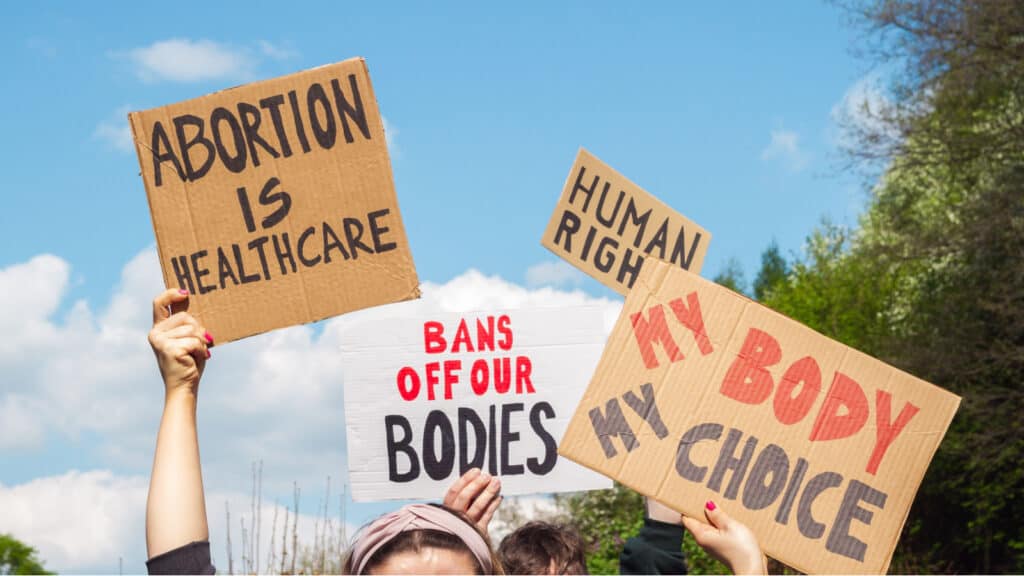The Cost of Restrictive Abortion Laws: Women Are Dying After Being Denied Medical Care
The implementation of restrictive abortion laws in various U.S. states has led to significant challenges in providing timely and necessary medical care to pregnant women facing complications. These laws, often designed to protect fetal life, have, in some cases, resulted in delayed or denied medical interventions, leading to severe health consequences and, tragically, fatalities. The following cases highlight the dire repercussions of such legislation.
If you are pregnant and need help – any kind of help – please see our Resource article.
If you are seeking abortion services please see our guide here.
1. The Case of Nevaeh Crain

In October 2023, 18-year-old Nevaeh Crain from Texas experienced severe pregnancy complications. Over a span of 20 hours, she visited two different emergency rooms three times, presenting symptoms indicative of a miscarriage and sepsis. Despite her deteriorating condition, medical professionals delayed necessary interventions due to the presence of a fetal heartbeat, as mandated by Texas’s restrictive abortion laws. By the time appropriate care was administered, it was too late; Nevaeh succumbed to sepsis, a life-threatening response to infection.
2. The Tragedy of Josseli Barnica

In September 2021, 28-year-old Josseli Barnica, also from Texas, faced a similar ordeal. At 17 weeks pregnant, she began experiencing a miscarriage. However, due to the state’s stringent abortion restrictions, medical staff were unable to perform necessary procedures until there was no detectable fetal heartbeat. This delay allowed a severe infection to develop, leading to Josseli’s death from sepsis.
3. Amanda Zurawski’s Near-Fatal Experience

Amanda Zurawski, a resident of Texas, was 18 weeks pregnant when her water broke prematurely. Despite the non-viability of the pregnancy, doctors were hesitant to perform an abortion due to the state’s restrictive laws. Amanda was sent home without intervention and subsequently developed a severe infection. Only when her condition became critical did she receive the necessary medical care. While Amanda survived, she suffered significant health complications as a result of the delayed treatment. She has devoted her life to fighting these injustices.
4. The Ordeal of Mylissa Farmer

In Missouri, Mylissa Farmer faced a harrowing experience when her water broke at 17 weeks. Doctors informed her that the fetus would not survive, but due to Missouri’s abortion ban, they could not perform the necessary procedure. Mylissa was forced to travel to Illinois to receive appropriate medical care, highlighting the lengths to which women must go to protect their health under restrictive abortion laws.
5. Ashley Brandt’s Challenging Journey

Ashley Brandt, pregnant with twins in Texas, discovered that one of the fetuses had a fatal anomaly. Doctors recommended terminating the non-viable fetus to protect her health and the health of the other twin. However, Texas’s restrictive abortion laws complicated her care, forcing Ashley to travel to Colorado to receive the necessary medical intervention. This case underscores the additional financial and emotional burdens placed on women due to restrictive abortion legislation.
6. Amber Thurman: The First “Preventable: Death

Amber Nicole Thurman, a 28-year-old woman, faced a rare complication after taking abortion pills and tragically died during emergency surgery in August 2022, as reported by medical documents obtained by ProPublica.
According to ProPublica, this incident marks the first publicly known abortion-related death deemed “preventable” by an official state review committee. The publication also noted that it will soon release details of a second similar case.
The Rise of Cases in the United States Post-Roe v. Wade

Since the Dobbs v. Jackson Women’s Health Organization decision overturned Roe v. Wade, states across the U.S. have rapidly passed restrictive abortion laws. Women facing life-threatening complications in states like Texas and Oklahoma now face severe limitations on healthcare options.
For example, some hospitals have refused to perform necessary procedures on women with ectopic pregnancies or septic miscarriages, waiting until the patient is at imminent risk of death. As laws restrict medical judgment, more stories emerge of women suffering—and in some cases, dying—due to delayed or denied care.
Medical Professionals in Legal and Ethical Dilemmas

Physicians are bound by an oath to prioritize their patients’ well-being, but restrictive abortion laws increasingly put them at odds with this commitment. Doctors are now grappling with cases where, while they know the correct course of action to protect a patient’s health, they are restrained by legal constraints. The implications are profound: healthcare providers are forced to weigh the possibility of prosecution over the lives of their patients.
Prison For Doctors

For instance, under Texas’s restrictive laws, physicians can face up to life in prison or a $100,000 fine for performing an abortion not permitted under the state’s rules. Even if a patient’s health is at risk, the legal ambiguity has led many to err on the side of caution—at the potential expense of the patient’s life.
The Psychological and Emotional Toll

The women who survive such medical experiences are often left traumatized, suffering from post-traumatic stress, anxiety, and depression as a result of being denied prompt and appropriate care. For families, the grief of losing a loved one is compounded by the knowledge that their deaths might have been preventable. Public outcry has led to calls for government accountability and legislative change, but progress has been slow and contentious.
Public Health and Ethical Implications

The deaths of women denied timely medical intervention due to restrictive abortion laws have raised ethical questions about the prioritization of fetal viability over maternal health. Proponents argue that restrictive abortion laws protect unborn children, but opponents contend that they endanger women’s lives, disproportionately affecting those with fewer resources who cannot travel out of state or country for care.
The reluctance to prioritize women’s health in legislative agendas sends a troubling message about the value placed on their lives. With healthcare resources and personal safety at stake, the question remains: at what cost will society continue to enforce restrictive abortion laws?
Conclusion

The tragic deaths of women due to restrictive abortion laws underscore the complex balance between protecting fetal life and safeguarding women’s health. Denying medical care based on restrictive legal frameworks endangers lives and contradicts fundamental healthcare principles. As more cases of preventable fatalities emerge, public pressure mounts for lawmakers to consider comprehensive reforms that protect both maternal health and fetal life.
Without changes, restrictive abortion laws may continue to put countless women at risk, threatening not only their health but also their lives. Each case is a painful reminder that restrictive abortion laws, in their current form, can lead to irreversible consequences.
A Guide to Researching Abortion Services Securely and Discreetly

In today’s digital age, searching for information on abortion services in certain regions may feel risky. Due to restrictive laws, increased scrutiny, and the potential for online activity to be tracked, individuals seeking abortion information may worry about privacy concerns. This guide provides step-by-step advice for researching abortion services securely and discreetly, explaining why these measures are important in the current legal climate.
READ: A Guide to Researching Abortion Services Securely and Discreetly
Choosing Where To Be Pregnant: Which States Are Conducive To Safe Pregnancy

Women are facing a relentless assault in our nation, with the fundamental right to bodily autonomy hanging precariously in the balance. Increasingly, women are being stripped of their ability to choose whether or not they wish to carry a pregnancy to term, and vital healthcare services that could save lives are being withheld in an attempt to curtail women’s autonomy.
In response, we have identified 25 states where we believe women can reasonably expect conditions conducive to safe pregnancy.
READ: Choosing Where To Be Pregnant: Which States Are Conducive To Safe Pregnancy
Think Your Period-Tracking App Is Private? Think Again.

We have all heard and read the stories: our information online is not necessarily private. Concerns about the privacy implications of period-tracking apps have surfaced, particularly in light of recent legal developments impacting reproductive rights. With millions relying on these apps for health monitoring and family planning, questions arise regarding the safety and security of personal data. But just how warranted are these concerns, and what steps can users take to protect their privacy?
READ: Think Your Period-Tracking App Is Private? Think Again.
Join Us

Join us on this empowering journey as we explore, celebrate, and elevate “her story.” The Queen Zone is not just a platform; it’s a community where women from all walks of life can come together, share their experiences, and inspire one another. Welcome to a space where the female experience takes center stage. Sign up for our newsletter so you don’t miss a thing, Queen!







